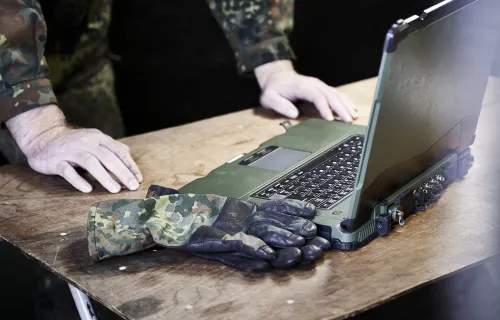The Ministry of Defence (MOD) is one of the UK's largest health providers delivering primary, intermediate and secondary healthcare and dental services to the armed forces. This includes occupational health and public health support for some 200,000 service personnel, 50,000 dependents and many veterans.
What was needed
The UK armed forces are known for planning, training and operational skills. To support these, the MOD needed an electronic, medical and dental health records system accessible from any military location, anywhere – including operational theatres abroad and at sea. The system would enable a two-way flow of information with the British National Health Service (NHS) and in the future, connect with our allies' systems in NATO and US.
The challenge
The new centralised system – the critical part of the Defence Medical Information Capability Programme (DMICP) – would replace legacy health records and other data held on disparate computers and on paper at up to 500 medical and dental facilities around the world ashore and afloat.
The programme also involves significant business change: making staff more efficient by simplifying records, avoiding duplication, and facilitating easy and consistent data entry. With DMICP, there would be a single and complete record for all eligible patients. Patient treatment would improve in quality and pace. The overall level of health in the Armed Forces would rise to achieve what the Surgeon General calls the 'Gold Standard'.
Our answer
CGI hosts the integrated health records system at our secure data-centre in Wales. EMIS PCS, an off-the-shelf product widely used within the NHS for medical records, is used and has been adapted to meet the specific requirements of the military population.
Pilot trialing at UK based service medical facilities was followed by a rollout programme of up to eight sites a week. Each rollout included the migration of legacy data, on-site configuration of PCs and printers, and training of users – from doctors and nurses to pharmacists, administrators and practice managers. Accessed via a dedicated portal, the application was further enhanced. We developed a dental module that would enable the creation of dental treatment plans and electronic tooth charting. This facility also provides key information on relevant medical data on patients. This is a big step forward for military dentists whose records are now available in an integrated healthcare information system.
The DMICP system is linked to the MOD's Joint Personnel Administration system thus ensuring patient contact details are always kept up to date and patient recall for treatment is more reliable.
Next, a deployed solution was developed and installed on mobile units (ships) and in operational theatres such as Iraq and Afghanistan (where local nationals also receive MOD treatment). Patient records can now be updated locally and synchronised with the data centre when suitable communications links allow. This is a significant benefit as it enables continuous care of serving personnel returning from operations.
In addition to the central database of records available to clinicians, a data warehouse with an anonymised copy of the records is available to appropriate headquarters staff to undertake data analysis (e.g. epidemiology) and management using the Cognos MIS tool. Alongside this central analysis capability the core product has been further enhanced to allow local practices to gather reporting data in a more tailored fashion.
DMICP is used in MOD's medical and dental facilities worldwide. Over 350,000 centralised records are being used by as many as 2,500 concurrent users doing up to 20,000 consultations per day.
The next steps will be full integration with the NHS systems and the introduction of a digital dental x -ray facility so these images can be included in the integrated healthcare record. The MOD is implementing a programme to further rationalise existing processes and improve data quality and patient care. This process will be ongoing as the use of DMICP expands into areas such as physiotherapy and mental health services.
A success story
DMICP is transforming the medical and dental capabilities of the UK armed forces.
- Data is now securely accessible in real time around the world, from medical centres at home to ships at sea and battlefields overseas
- Personnel and their dependents get faster, more accurate treatment
- Medical resources are being used more efficiently, with constant improvement in processes enabled
- Senior staff have access to improved medical management information, showing, for example, which personnel are fit for deployment
- Proper records will be passed on to the NHS for treatments or on discharge, benefiting both serving personnel and veterans
- Latest best practices and treatments will be readily available for all patients
- The system is fully auditable, secure and updateable.
Why Work with CGI
We're a premier supplier to the UK Ministry of Defence and have carried out many healthcare system implementations for the NHS. Our security expertise is second to none. This project needed someone who brought together all three strengths and that's what we did. We realised that the successful execution of DMICP wasn't simply IT implementation but more an opportunity for change management and transformation.




